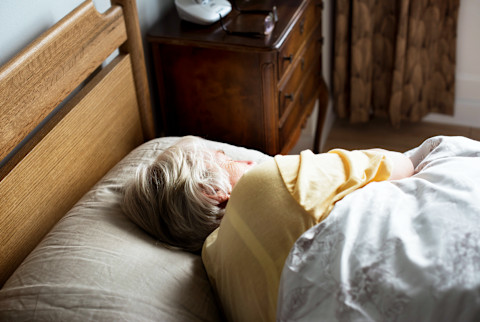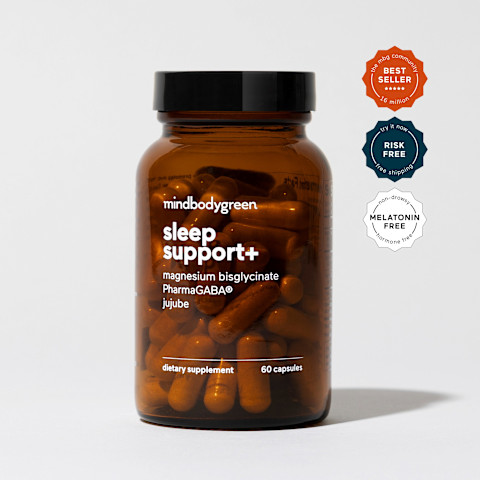
Deep-belly yawns, midday naps, a thirst for caffeine: Some signs of sleepiness are obvious. But since sleep fuels so many processes in the body, tiredness can also be more subtle. Here are six lesser-known signals that you might want to start making deep sleep a higher priority:
You're always thirsty
In one 2018 study published in the journal Sleep, data from over 25,000 adults from China and the United States showed that those who consistently slept six hours a night or less had a 16 to 59% higher chance of having suboptimal hydration than those who regularly clocked eight hours.
The researchers said a hormone called vasopressin might explain this, as sleep seems to help this hormone do its job of regulating fluid levels in the body.
You fall asleep instantly
While lying awake with racing thoughts is no fun, falling asleep as soon as your head hits the pillow isn't the goal either. Ideally, you want to fall asleep within 20 minutes of closing your eyes. Dozing off within this time frame is a sign that your body and mind are ready for sleep but not completely exhausted.
You have a low sex drive
Sex drive is largely dictated by hormones, and quality sleep helps keep these hormones in check. One study in the Journal of Clinical Endocrinology & Metabolism1 found that sleep was important for maintaining healthy levels of testosterone in particular: a sex hormone that gets both men and women in the mood.
You often have negative thought patterns
When we get a night of less-than-great sleep, sour moods often follow. One small study in Clinical Psychological Science2 found that those who did clock enough hours of deep sleep had, on average, 50% more unwanted thoughts the next morning than those who had a quality night's sleep. On the other hand, getting enough rest seems to promote a positive mood3 and support our capacity for mindfulness.
You're always craving sugar & carbs
When we're not getting as much sleep as we should, it can stimulate hunger for certain types of foods. "Poor sleep affects your hypothalamus, the master control center in your brain of hormones like cortisol, epinephrine, and norepinephrine... Not getting enough sleep can also lead to poor eating decisions," board-certified internist Vincent Pedre, M.D., previously wrote of the sleep-gut connection on mbg. He notes that sleep helps curb cravings for high-calorie, low-nutrient snacks like candy bars, chips, chocolates, and other desserts.
Your workouts feel harder than usual
Sleep is when our bodies recover from the demands of the day, so when we don't get enough of it, we can't operate at our best physically. If your usual workouts start to feel more difficult, it could be a sign you could use more sleep. "Try getting an extra 30 minutes of sleep every night. You might be surprised just how much better you will feel," says board-certified sleep specialist Michael J. Breus, Ph.D.
What to do about it
Everyone's sleep needs are slightly different. When it comes to the amount of sleep you should aim for each night, there is no magic number—though seven to nine hours is a range that most experts recommend.
Waking up feeling refreshed in the mornings, getting tired around the same time every night, falling asleep quickly (but not too quickly!), and staying asleep throughout the night are all signs that your body has fallen into a healthy sleep rhythm.
If you're not quite there yet, making sleep a priority starts with setting and sticking to a consistent bedtime and wake-up time that leaves you plenty of time in bed.
In addition to prioritizing sleep quantity, optimizing sleep quality is essential. Some habits that can throw it off include eating fatty foods right before bed, drinking alcohol or caffeine too late in the day, looking at screens at night, and keeping your bedroom too hot or too bright.
Keeping up with a low-tech wind-down routine, investing in a supportive pillow, and taking a relaxing supplement like mbg's sleep support+, which combines magnesium bisglycinate, jujube, and PharmaGABA® will also help promote deep and restorative sleep—and the health benefits that come with it.*
It's worth noting that many of these sensations of sleeplessness can also be signs of a more serious medical issue. If they persist or seem to get worse, regardless of how much sleep you get, you'll want to check in with your doctor.
The takeaway
Sleep is nothing to snooze on. Deep, high-quality rest can pay dividends for everything from your mood to your sex drive. It's a gift to yourself that'll keep on giving long after the alarm goes off.

